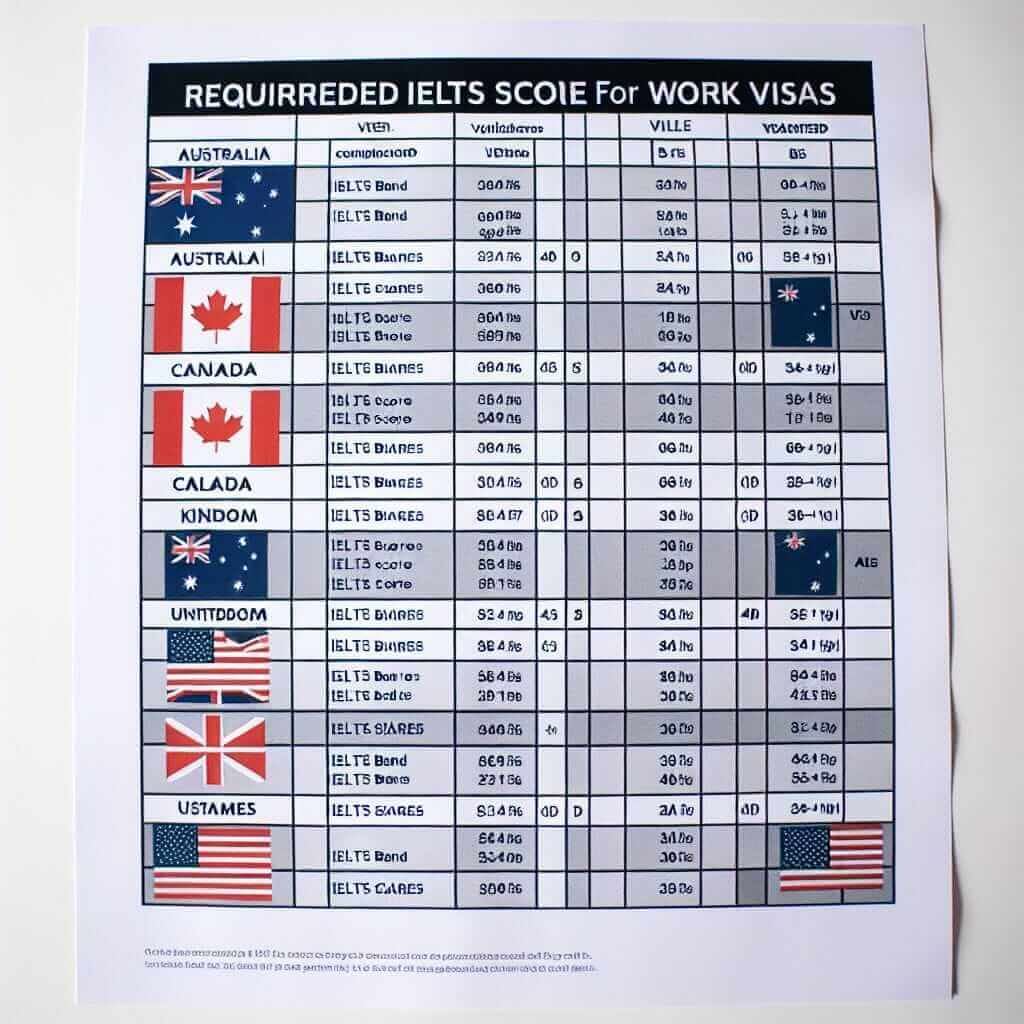The International English Language Testing System (IELTS) is a globally recognized English language proficiency test. Achieving a specific IELTS band score is a key requirement for many work visa applications across different countries. In this article, we will delve into the importance of IELTS scores for work visas, explore common requirements, and provide guidance on how to prepare effectively.
Understanding the IELTS Band Requirement for Work Visas
When applying for a work visa, many countries require proof of English language proficiency. The IELTS exam is widely accepted and recognized for this purpose. The required IELTS band score can vary based on the country and the type of visa you are applying for. Generally, work visas require a minimum score in the range of 5.0 to 7.0, with specific requirements for each band (Listening, Reading, Writing, and Speaking).
Example Requirements by Country
- Australia: For a skilled worker visa, an overall band score of 6.0 in IELTS is usually required, with no band below 6.0.
- Canada: The Canadian immigration system uses the Canadian Language Benchmark (CLB) to convert IELTS scores. The minimum requirement for many skilled worker programs is a CLB 7, which equates to an IELTS score of at least 6.0 in each band.
- United Kingdom: The Tier 2 (General) work visa typically requires an overall IELTS band score of 4.0.

Common Misconceptions and Tips
Examples to Illustrate Requirements
- Australia Example: If you’re applying for an Australian skilled worker visa, aiming for an overall band score of at least 6.0 without any band below 6.0 is crucial. In Reading, you may need to comprehend complex texts with advanced vocabulary.
- Canada Example: For Canadian skilled immigration, a CLB 7 equates to an IELTS score of at least 6.0. In Speaking, this means you should be able to discuss various topics fluently and coherently.
- UK Example: For the UK Tier 2 visa, an IELTS band score of 4.0 means basic communication skills. In Writing, you need to express simple ideas but maintain clarity.
Applying Knowledge to IELTS Test Sections
- Listening: Practice listening to various accents, especially those from countries like Australia, Canada, and the UK. Use podcasts, news channels, and IELTS listening practice tests.
- Reading: Improve your reading skills by exploring technical documents, manuals, and news articles. Focus on skimming and scanning techniques.
- Writing: Regularly practice writing essays and reports. Pay attention to coherence, grammar, and vocabulary.
- Speaking: Engage in regular conversations with native speakers or participate in language exchange programs.
Common Mistakes to Avoid
- Underestimating one section: Each band (Listening, Reading, Writing, Speaking) is important. Focusing on one and neglecting others can adversely affect your overall score.
- Ignoring exam structure: Familiarize yourself with the test format. Improper time management or misunderstanding questions can lower your score.
- Inconsistent practice: Consistent, well-rounded practice across all sections is crucial for a balanced score.
Effective Practice Strategies
- Mock Tests: Take full-length IELTS practice tests under timed conditions to simulate the exam day experience.
- Daily English Use: Incorporate English into your daily routine. Read novels, watch English-language films, or converse in English daily.
- Professional Feedback: Consider enrolling in an IELTS preparation course or hiring a tutor to get personalized feedback and guidance.
Conclusion
Understanding the IELTS band requirement for work visas is essential for achieving your immigration goals. By thoroughly preparing for each section of the exam, recognizing common pitfalls, and employing effective strategies, you can improve your chances of obtaining the required IELTS scores. Remember, consistent effort and strategic preparation are key to success.
Feel free to leave comments or questions below, and explore other resources on our website to further enhance your IELTS preparation. Good luck!